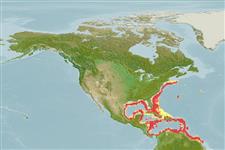Teleostei (teleosts) >
Gadiformes (Cods) >
Merlucciidae (Merluccid hakes)
Etymology: Merluccius: Latin, mar, maris = the sea + Latin, lucius = pike (Ref. 45335).
More on author: Mitchill.
Environment: milieu / climate zone / depth range / distribution range
Ecology
Marine; bathydemersal; non-migratory; depth range 80 - 1170 m (Ref. 1371), usually 160 - 640 m (Ref. 1371). Deep-water; 42°N - 4°N, 98°W - 50°W (Ref. 58452)
Western Central Atlantic: Georges Bank, New England to Suriname and French Guiana.
Length at first maturity / Size / Weight / Age
Maturity: Lm 28.0 range ? - ? cm
Max length : 40.6 cm TL male/unsexed; (Ref. 1371); 70.0 cm TL (female); common length : 30.0 cm TL male/unsexed; (Ref. 1371); common length :45 cm TL (female); max. published weight: 0.00 g
Dorsal spines (total): 1; Dorsal soft rays (total): 45 - 51; Anal spines: 0; Anal soft rays: 35 - 41; Vertebrae: 51 - 53. Head rather long; mouth large; gill rakers short and thick, with blunt tips; pectoral fin tips reaching a vertical through anus in small fish but not in larger ones; overall color silvery white (Ref. 1371).
Offshore species which inhabit the outer part of the continental shelf and upper part of the slope. Feed at night when they come up towards the surface (Ref. 1371). Juveniles feed primarily on crustaceans (Ref. 58452). Adults' food consists primarily of fishes (particularly lantern fishes, sardines and anchovies) and, to a lesser extent, crustaceans and squids (Ref. 1371). Spawning occurs near the bottom at 330-550 m depth range from April to July in New England and from late spring to early autumn in the Gulf of Mexico and the Carribean Sea (Ref. 58452). Marketed fresh, frozen and smoked.
Cohen, D.M., T. Inada, T. Iwamoto and N. Scialabba, 1990. FAO species catalogue. Vol. 10. Gadiform fishes of the world (Order Gadiformes). An annotated and illustrated catalogue of cods, hakes, grenadiers and other gadiform fishes known to date. FAO Fish. Synop. 125(10). Rome: FAO. 442 p. (Ref. 1371)
IUCN Red List Status (Ref. 130435: Version 2024-1)
Threat to humans
Harmless
Human uses
Fisheries: minor commercial
Tools
Special reports
Download XML
Internet sources
Estimates based on models
Preferred temperature (Ref.
123201): 7.1 - 20.5, mean 12.6 °C (based on 182 cells).
Phylogenetic diversity index (Ref.
82804): PD
50 = 0.5000 [Uniqueness, from 0.5 = low to 2.0 = high].
Bayesian length-weight: a=0.00759 (0.00458 - 0.01258), b=3.01 (2.86 - 3.16), in cm total length, based on LWR estimates for this species & (Sub)family-body (Ref.
93245).
Trophic level (Ref.
69278): 3.4 ±0.0 se; based on diet studies.
Generation time: 2.3 ( na - na) years. Estimated as median ln(3)/K based on 2
growth studies.
Resilience (Ref.
120179): Medium, minimum population doubling time 1.4 - 4.4 years (Assuming tmax > 3 and tm >=2; K=0.57; Fec=340,000).
Fishing Vulnerability (Ref.
59153): Low to moderate vulnerability (30 of 100).
Climate Vulnerability (Ref.
125649): Low to moderate vulnerability (29 of 100).
Nutrients (Ref.
124155): Calcium = 16.3 [7.2, 65.7] mg/100g; Iron = 0.484 [0.080, 1.352] mg/100g; Protein = 17.2 [15.7, 18.6] %; Omega3 = 0.252 [0.112, 0.506] g/100g; Selenium = 24.9 [9.8, 55.4] μg/100g; VitaminA = 11 [2, 52] μg/100g; Zinc = 0.301 [0.197, 0.490] mg/100g (wet weight);
